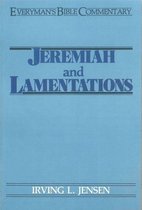Septuagint - Septuagint: Letter of Jeremiah Ebook Tooltip Ebooks kunnen worden gelezen op uw computer en op daarvoor geschikte e-readers.
Afbeeldingen
Sla de afbeeldingen overArtikel vergelijken
- Engels
- E-book
- 9781989604168
- 15 oktober 2019
- Epub zonder kopieerbeveiliging (DRM)
Samenvatting
The Letter of Jeremiah was included in the Septuagint, generally, after Lamentations, which was likewise traditionally attributed to Jeremiah or Baruch. This letter claims to be the letter that Jeremiah had written for the Judahites that had been taken away as captives when the Babylonians conquered Judah, as described in the Book of Judah, that Baruch took to Babylon. There are several letters included in the Book of Jeremiah that are attributed to Jeremiah, as well as a letter in the Book of Baruch that claims to be Jeremiah’s letter to the Judahites in Babylonia. The authenticity of the Letter of Jeremiah has been debated throughout its existence, for multiple reasons, including the content of the letter itself, which seems to be implying Judahites should not stop worshiping the sun, moon, and stars, to worship the idols of Babylon. The worship of the sun, moon, and stars was banned by King Josiah, the son-in-law of Jeremiah, under what was most likely Jeremiah's spiritual leadership, in order to promote the god Yahweh.
This policy was clearly reversed under the reign of King Jehoiakim, and the prophet Jeremiah appears to have spent much of Jehoiakim’s rule in prison. Baruch was sent by the Judahite court to be Jeremiah’s scribe, however, Baruch clearly described his god as being the sun in the Book of Baruch, which he identified as having the sacred name of Amen. In 1st Ezra, the Egyptian King Necho II also identified the Judahite god as being the sun god, meaning the Judahites at the time of Jeremiah and Baruch, were predominantly worshiping the sun like the surrounding kingdoms, nevertheless, Jeremiah urged them to abandon sun-worship, and worship Yahweh. Therefore, the Letter of Jeremiah was almost certainly not written by Jeremiah, although might have been written by Baruch. This is the general Catholic interpretation, and the Letter of Jeremiah is inserted as the final chapter of the Book of Baruch in Catholic Bibles.
The history of the Letter and its place in the Christian canon has been debated since the earliest surviving Christian writings on it. Origen of Alexandria, writing in the early-3rd-century AD, considered the Book of Jeremiah, Lamentations, and the Letter of Jeremiah to be one bigger Book of Jeremiah. Epiphanius of Salamis, writing in the late-3rd-century, considered the Book of Jeremiah, Book of Baruch, Lamentations, and the Letter of Jeremiah to be one bigger Book of Jeremiah. This view was repeated by Athanasius I of Alexandria in the mid-4th-century, and Cyril of Jerusalem in the late-4th-century. The view that the Septuagint’s Book of Jeremiah, Book of Baruch, Lamentations, and the Letter of Jeremiah are one large Book of Jeremiah was then canonized by the Council of Laodicea in 364 AD.
The idea that the Letter of Jeremiah should not be part of Biblical canon is traced to Jerome, the translator of the original official Latin translation of the Bible, in the late-4th-century. The Masorites, a Jewish sect of scribes, had been copying a Hebrew translation of the scriptures that included books of Jeremiah and Lamentations, but not Baruch or the Letter. Jerome interpreted this as evidence that the Book of Baruch and the Letter of Jeremiah originated in Greek, and were not originally Judahite or Samaritan works, like the texts the Masorites were copying. As a result, he relegated the two Greek works to the Apocrypha section of his Bible, where they have generally stayed in Catholic and Protestant bibles ever since. Fragments of the Letter of Jeremiah have been discovered among the Dead Sea Scrolls, written in Hebrew, and dated to circa 100 BC, so the letter did not originate in Greek. The Eastern Orthodox Bibles continued to include the Letter of Jeremiah, as did the Ethiopian Tewahedo Bibles, which includes the Letter as part of Paralipomena of Jeremiah, along with 4th Baruch.
Productspecificaties
Inhoud
- Taal
- en
- Bindwijze
- E-book
- Oorspronkelijke releasedatum
- 15 oktober 2019
- Ebook Formaat
- Epub zonder kopieerbeveiliging (DRM)
Betrokkenen
- Hoofdauteur
- Scriptural Research Institute
- Hoofduitgeverij
- Smashwords Edition
Lees mogelijkheden
- Lees dit ebook op
- Android (smartphone en tablet) | Kobo e-reader | Desktop (Mac en Windows) | iOS (smartphone en tablet) | Windows (smartphone en tablet)
Overige kenmerken
- Studieboek
- Nee
EAN
- EAN
- 9781989604168
Je vindt dit artikel in
- Categorieën
- Taal
- Engels
- Boek, ebook of luisterboek?
- Ebook
- Beschikbaar in Kobo Plus
- Beschikbaar in Kobo Plus
- Beschikbaarheid
- Leverbaar
Kies gewenste uitvoering
Prijsinformatie en bestellen
De prijs van dit product is 2 euro en 99 cent.- E-book is direct beschikbaar na aankoop
- E-books lezen is voordelig
- Dag en nacht klantenservice
- Veilig betalen
Rapporteer dit artikel
Je wilt melding doen van illegale inhoud over dit artikel:
- Ik wil melding doen als klant
- Ik wil melding doen als autoriteit of trusted flagger
- Ik wil melding doen als partner
- Ik wil melding doen als merkhouder
Geen klant, autoriteit, trusted flagger, merkhouder of partner? Gebruik dan onderstaande link om melding te doen.








